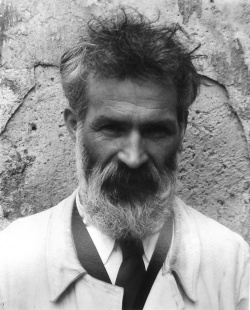Difference between revisions of "Constantin Brâncuşi"
Jump to navigation
Jump to search
m (Text replacement - "==External links==" to "==Links==") |
|||
| Line 13: | Line 13: | ||
He left behind around 1200 photographs and 215 sculptures. | He left behind around 1200 photographs and 215 sculptures. | ||
| − | == | + | ==Links== |
* [http://en.wikipedia.org/wiki/Brancusi Brâncuşi on Wikipedia] | * [http://en.wikipedia.org/wiki/Brancusi Brâncuşi on Wikipedia] | ||
* [http://ro.wikipedia.org/wiki/Constantin_Br%C3%A2ncu%C8%99i Brâncuşi on Romanian Wikipedia] | * [http://ro.wikipedia.org/wiki/Constantin_Br%C3%A2ncu%C8%99i Brâncuşi on Romanian Wikipedia] | ||
* [http://www.guggenheim.org/new-york/collections/collection-online/artists/698 Brâncuşi in the Guggenheim Museum] | * [http://www.guggenheim.org/new-york/collections/collection-online/artists/698 Brâncuşi in the Guggenheim Museum] | ||
Revision as of 11:33, 2 June 2015
 Brâncuși in 1922. Photo by Edward Steichen. | |
| Born |
February 19, 1876 Hobiţa, Gorj |
|---|---|
| Died |
March 16, 1957 (aged 81) Paris, France |
Constantin Brâncuşi was a Romanian-born sculptor who made his career in France. His most well-known works include the Sleeping Muse (1908), The Kiss (1908), Prometheus (1911), Mademoiselle Pogany (1913), The Newborn (1915), Bird in Space (1919) and The Column of the Infinite (Coloana infinitului), also known as The Endless Column (1938). Considered the pioneer of modernism, Brâncuși is called the patriarch of modern sculpture.
Legacy
He left behind around 1200 photographs and 215 sculptures.